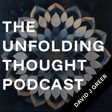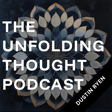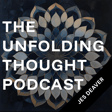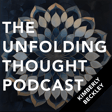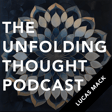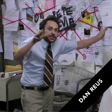Introduction to Unfolding Thought Podcast
00:00:04
Speaker
Hi, I'm Eric Pratum. Welcome to the Unfolding Thought Podcast, the show for leaders and deep thinkers who demand more than the usual fluff. If you're the kind of person who moves on from a book, video, or podcast, the moment it stops making you think or introducing you to something you can use, I hope you'll feel right at home here.
00:00:29
Speaker
In each episode, we uncover the deeper, often overlooked forces that shape our thoughts and behaviors. So you can see yourself, your team, and the world from a whole new angle, and then actually apply what you learn to grow and do better.
00:00:48
Speaker
On the Unfolding Thought Podcast, we aim for minimal filler and maximum insight, challenging assumptions and sparking new thinking every step of the way. Are you ready to dive deeper? Then let's get started.
Introducing Bill Jacobs and Analytical Ones
00:01:05
Speaker
Today, I'm speaking with Bill Jacobs, founder of Analytical Ones. Bill is a fundraising economist, applying a blend of quantitative sociology and strategic thinking to help nonprofits optimize how they engage donors and cultivate meaningful gifts. With more than 20 years of experience running his own business, Bill shares insights on the changing donor landscape the tension between creativity and data and why the cost of acquiring donors has nonprofits rethinking their entire approach to fundraising. And and now I bring you Bill Jacobs. Bill, thank you for joining me. Would you mind telling me a little bit about yourself?
Understanding Fundraising Economics
00:01:53
Speaker
Yeah, thanks Eric. It's great to be here. I'm Bill Jacobs. I'm a fundraising economist. So my company focuses on helping nonprofit organizations and their agency partners optimize their fundraising. And typically we ground those strategic recommendations into the database. So my team spends a lot of time looking at the data, donor behaviors, and making smart decisions on how they can better fundraise to their constituents. You said fundraising economist, and I don't recall that I've ever
00:02:33
Speaker
heard that that term or that phrase, you know, when I think of economists, there are all these, you know, sometimes funny descriptions and sometimes academic descriptions like the dismal science or sort of the study of scarcity. So I'm curious, in what way is it economics?
00:02:51
Speaker
So economics is one of the social sciences. If you look, you know, there's different social sciences that fall under the umbrella of sociology. Economics is basically the world's relationship to money and how that interaction occurs. So um I take it one step further because we are working in a niche of fundraising So everything that we're doing is looking how how people's philanthropic behavior occurs, why it occurs. And so it's really yeah specific to donor relationships to organizations. I think you said your particular focus is the donor file or or the CRM. Is that right? Yes.
00:03:35
Speaker
and suppose you are really focused on the money so to speak rather than some of the things that maybe some people are. More familiar with in the economic space over the last gosh what twenty or thirty years like behavioral economic sort of stuff that's not about the money as much as it is the management of people's attention. Yeah yes you can you can say that okay so how did you get into the space.
00:04:01
Speaker
You know, it was a desire to use, I had a quantitative background in quantitative methodologies. So my master's degree was in quantitative sociology. And I started out being a primary researcher, surveys, focus groups, that kind of thing for corporate businesses.
00:04:21
Speaker
and didn't find that as fulfilling as I had hoped. So I wanted to kind of, you know as ah Martin Luther King said, if you can't be the tallest pine on the hilltop, be a shrub in the valley. And so this is kind of ah my way of being a shrub in the valley, as as trying to do things that help ah the world. And I've divided nonprofit causes in two.
00:04:46
Speaker
two different categories. One are life-saving, so those organizations that are out there literally saving lives. And then there's the life-enhancing organization, the arts, the museums, the zoos, and those kind of things. So both of those things help people um have have lives and have better lives.
Bill's Consulting Experience and Industry Changes
00:05:04
Speaker
And it's fun to be a part of that. About how long have you been working in nonprofits or fundraising?
00:05:10
Speaker
over 25 years now. And I've had my own company for over 20 years of that period. And most of that time in in that I've never been on the nonprofit side of the fence. I've always been on the consulting side of the fence. And that's where I'm most comfortable and I think I'm most effective.
00:05:29
Speaker
In addition to running your own company, which as I understand it, there have been times when it's been just you, there have been times like I think now where you have a staff though, it if it's appropriate, of course, we can describe different models and all about you you've had. I don't know if that'll fit in, but in addition to that.
00:05:48
Speaker
You've also had one or more positions in agencies throughout your career where, you know, you were working within a group of a couple hundred people.
00:06:00
Speaker
Yes. So I've had two experiences where I was, you know, a W2 employee at agencies, one in Seattle and one in Atlanta. And then sprinkled between that has been running my own companies. I've also had the opportunity to do some teaching at the college level, both in sociology and marketing, which is very fun. I'd love to have more time to do that.
00:06:21
Speaker
But yeah, so the agencies, you know, and this could be a whole different topic that we may not want to get into today, but agencies are really going through a lot of dynamic changes right now, which has actually been very good for our company because through that bit of chaos is that there's creating more opportunities for small agencies to, to exist. And since quantitative are kind of expensive people to have on staff.
00:06:49
Speaker
We're kind of like a timeshare of quantitative analysis or fundraising. So we have a relationship with quite a few ah smaller agencies and we really enjoy ah the smaller company environments.
Data-Driven Fundraising Strategies
00:07:02
Speaker
You said quantitative sociology. So I'm guessing that most people who listen to this have at least a a vague sense of what sociology is.
00:07:12
Speaker
And so quantitative sociology is the more data-driven side, like you're working more with databases. And more of what we call hard data rather than soft data. So rather than observational, it's a well for for, in our particular case, it's the donor databases. By law, organizations have to keep track of those people who give money to them for tax purposes.
00:07:36
Speaker
So ah they have to record each and every donation on that. And it's amazing how much insight you can glean from, you know, gift date, gift amount, gift source. Just those few fields allow us to do a ah lot of deeper analytics that help provide insights for the marketing of the fundraising. If I can try and recap or encapsulate a little bit of what I think you've described as what you do or your background,
00:08:05
Speaker
your company would be called in by either a nonprofit or a nonprofit focused agency and. You're going to look at their donor database who has given when what they've given all of that as much history as they have and.
00:08:24
Speaker
you know I have some background in the space so I know that sometimes there's really good data and sometimes there's not. And so ah you're doing whatever work is necessary in order to understand that data, to provide some insight, and then to eventually provide some recommendations. Perhaps not always, but often I'm guessing you're looking at the last five years of data, for example, and saying, hey, in March, you tend to get the best responses or the highest ah ROI responses or the best acquisition of new donors. If you go out with these types of messages or it looks like this is the direction that your data is trending, that's effectively.
00:09:12
Speaker
What's your business history? That's exactly correct. I would add is that there you know there's two components to fundraising. in you know And I know you know this, but it's that art and science. So there's the science, the quantitative that's showing what the data is telling us. But there's also the creative side. And so that that line is always moving to optimize the fundraising. It's like what How much creative versus how much data? I mean, you don't want to be all data-driven because that ends up being a ah really inexpensive package nobody responds to. If it's all creative-driven, it tends to be a very expensive package that not enough people respond to. So there's there's always this tension between the creative and the science on that, and and that that's part of the attraction of the space.
00:09:59
Speaker
So do you get put in situations where you look at a data set and someone says, so okay, Bill, so what are we supposed to do in this next year? And do you have really not enough data or not enough confidence? Well, I i mean, it is a changing environment. it's you know you're You're not stepping in the same stream twice. you know it It is always changing.
00:10:23
Speaker
And and it it's interesting because a lot of a lot of organizations and agencies want to know why their donors give. you know Donors don't even know why they give. i have a I have a belief that giving is kind of a transcendent experience. I don't understand my own giving behavior. Like one day oh I'll get a something in the mail.
00:10:46
Speaker
And it's just not there. and And the next day it seems like I'm primed to want to give. And I don't understand why that is. And so it's really hard to do these giving motivational studies. And I've done dozens of them and they've all been disappointing. Because again, people really don't understand their own giving behavior. That's why we go back to the hard data. It's like, okay, let's let's take away the whys and what happened. And can we correlate those actions with other, you know, the descending of something or the offer and make fairly good ah hypotheses based on the the data that is hard rather than trying to come up with some of the more softer questions. Right. So even if, you know, the motivations for someone to make a donation are 10% of all of the factors, the color of the envelope,
00:11:46
Speaker
that they receive or the day on which they receive a phone call or and whatever else it is any of those things that you can measure even that's so if that's only ten percent of what contributes to them making a donation.
Optimizing Fundraising with External Support
00:11:59
Speaker
I think what I hear you saying is if we can.
00:12:02
Speaker
Remove the uncertainty from that 10%. Then there are less things, less factors you have to worry about when you now have to get creative and say, what's the new thing we're going to do this next year? Right. So the decision is multivariate. There's a lot going on when you decide to give. How much, who, when, all those things. And there's a lot of variables that are affecting that particular decision.
00:12:24
Speaker
So some of those you can control, some of those you can't. So let's focus on those variables that you do have some control over to, again, the the whole the whole purpose is to optimize your fundraising, which means least amount of effort and investment to maximize the word return.
00:12:46
Speaker
a nonprofit that might listen to this and say, you know, we send out our direct mail or whatever their fundraising is, but we don't have anybody who does any analytics or data. How do they know when it's time to call you?
00:13:05
Speaker
Well, typically, like like most things, it's management by exception. when When they have a problem or there is a change of leadership or whatever, there's there's usually there's a problem within the organization or there's somebody that comes in that is very data-driven in their management style.
00:13:26
Speaker
Those are typically kind of the two variables that cause us to be brought in to start analyzing. and it It starts very big. We want to look at the first thing we would always do. We have a couple different analyses that we do just to understand the lay of the the database.
00:13:47
Speaker
And from the standard analyses come become the ad hoc questions like, why is this this way? And why is this that way? and And so that, again, if we have the data, you know we have our own tools that are able to to dig into that and understand and try to get down to those answers.
00:14:06
Speaker
There are few things that we haven't seen, but again, it's a dynamic environment. Things are changing and we're always learning. As someone who has worked a lot with data, when you're watching the Super Bowl or you're just being a person out in the world, right? Is it common for you to encounter something and think, what were they thinking? Absolutely. And I used to blog about those experiences until I got too many people. kids ah Typically, it's on the critical side. My my spiritual gift is criticism, i I've been told. And to receive some of these different packages,
00:14:50
Speaker
And I'm just like, you know, am I in the test panel? Because overall, the database, if you have big enough numbers, direct response fundraising is very simple, similar to life expectancy actuarial tables. I mean, if you give me 20,000 donors. We have pretty good metrics on where those donors should be performing. Just like they have, hey, are they male? Are they a certain age? Are they a smoker or not a smoker? All those things segment people into their life expectancy. The same thing happens in donor behavior.
00:15:22
Speaker
And so if an organization is missing those benchmarks, there's something fundamentally wrong going on at that organization. So that's why we start with the very standard analytics because it allows us to see are there activities or metrics going on that just aren't making sense and and really need to be fixed as soon as possible.
00:15:43
Speaker
So when you see things like, gosh, within the last few weeks before this recording, if you were on LinkedIn, there's this flash in the pan of everybody talking about the Jaguar rebrand. And so.
Challenges and Innovations in Nonprofit Sector
00:15:58
Speaker
you see things of that nature or how long ago was it that jc penny hired the i think it was the apple store guy and said we're getting rid of sales now we're not necessarily talking about a customer database let's say but there's a sort of like a wild leap or a crazy idea I'm not saying it's a bad idea necessarily, but some of us might look at that and say, I'm thinking the the numbers weren't there to back up the level or support the level of confidence that you had in making that kind of change.
00:16:38
Speaker
I would say it you're correct on some of the, love some of the recent developments that we've seen out there. I think it's, it's harder for nonprofit organizations because they do not have big marketing budgets. Like, I mean, and I know you and I have been in this client meeting before is like the client. It's like, Hey, we want to try something new. And then you come up with a new idea and like, well, who's tried it and what were their results? You know, is the, is the follow-up question.
00:17:02
Speaker
and That's because of the structure of nonprofit organizations with board of directors overseeing you know how things are spent, they're very conservative on trying anything new. and they're Typically, the risk of trying things new is just not worth it for the development team because of the amount of potential blowback they're going to get from from their respective boards.
00:17:25
Speaker
So, it typically, nonprofits move pretty s slowly with innovation, and they're typically about 10 years behind commercial organizations in execution. We're still not digitally fully functional, where most for-profit businesses, you know, by 2010, everybody had a pretty good website and you could do some transaction, and you're still running to people that are like, well, we have problems processing online donations.
00:17:55
Speaker
And we see that becomes a real problem. Like in Canada, they recently had the mail strike during the most important fundraising season. And those organizations that were not digitally capable or ready, I don't want to even see that data because it's going to be really, really difficult to look at when we get our tsunami of fall giving data here in the next few weeks.
00:18:20
Speaker
So I think you said that with the change that's going on in the agency space, or maybe nonprofits generally, that it's creating opportunities for smaller groups. And it kind of sounds like there's a, what would the term be, like a federated model or a confederated model maybe where multiple agencies need to pull on specialty groups? Could you describe, I guess, what's going on?
00:18:48
Speaker
Well, what what we've seen over basically the past decade is private equity getting involved in fundraising agencies to a large degree. So there's been a lot of consolidation where there used to be dozens and dozens and dozens of independent agencies. Now there are several large agencies.
00:19:10
Speaker
And then there's still the independence, but the way a private equity agency runs by its definition is going to be different than how the independence run. And by that, I mean is that the the discipline of, you know, controlling costs and efficiency, all those elements are really necessary and emphasized in the private equity environment.
00:19:37
Speaker
But sometimes I feel that they go a little too far with what I'd call the spreadsheet management and it's still a people business and organizations don't want to be. only looked at via spreadsheet. There is relationship involved that needs to be addressed. So what's occurred or what I have seen is a number of very talented people in that private equity space move out and start their own shop. It's just like, you know what? I can't do what's right for the client under spreadsheet management. So I'm going to start my own thing.
00:20:12
Speaker
As it gets bigger, then it splits off and starts the whole cycle starts again. So you're having a lot of smaller independence go out. And again, that's great for us because typically a new agency can't afford to hire a quant right out of the gate. You know, they want to rent one.
00:20:29
Speaker
Is it fair for me to assume you have not just more specialty shops on the quant side of things, but also perhaps a creative team or any number of other services I could imagine a scenario in which an agency might not have Project managers and now project management may be more central to the the work that an agency is going to do but just for the sake of argument you might have an agency that they go real deep on direct mail and then they contract with freelancers or smaller agencies to do all of their digital work to do all of the creative to do something like that so such that. We get into a situation where.
00:21:19
Speaker
The agency of record, so to speak, is really just the client manager or the sales team. And then groups like you are bundled together to provide a lot
Economic and Cultural Impacts on Fundraising
00:21:29
Speaker
of the services. Yeah, I mean, that's that's absolutely the way it starts. Typically, again, it's economically driven. Typically, as an organization has success and grows, it's like, hey, what can I bring in-house and be more efficient at?
00:21:45
Speaker
either from a cost-wise or from a control aspect. Because the issue that comes up with that is if you're contracting, you're creative, you're writing, or or us, we're working with a lot of different people just like a writer might be working with 10 different people.
00:22:01
Speaker
If you have something urgent come up that wasn't on the schedule, that writer may already be booked out and can't get back to you. And so eventually an organization, and typically there's a hierarchy of, you know, who do we want to bring in first? You know, first, so first sales leads, of course.
00:22:18
Speaker
account management, then you have to have production, all these other different elements involved. But you're absolutely right. That's how it starts. And then in a decade or two, those organizations will end up becoming the big, you know, big agencies that will get bought out by private equity and the whole cycle starts again. And I think you've probably encountered this more than I have. So tell me if I'm wrong or you disagree, but I find that while I believe that something of this nature, you know, the agency contracting some workout should be neutral, should be neither positive nor negative in and of itself. It really kind of depends on
00:23:05
Speaker
Are you delivering the service at an appropriate price providing an appropriate ROI the good or bad of the arrangement should be in some of those details are you delivering what you promised and all that I have often found that.
00:23:23
Speaker
A lot of clients immediately assume that if their agency is contracting with another group that they're being overcharged.
00:23:36
Speaker
This is an area where I'm subjective, obviously, so it's difficult to say what the end client is. that They may feel that way, however, if the agency is still delivering, like again, analytics are expensive. It's typically a cost center, not ah a value center for an agency. So to get that kind of advanced insights that require tools,
00:24:04
Speaker
And people currently, I mean, AI may replace all that in a short amount of time. But yeah, there's going to be additional, there's going to be costs associated with that. But the upside is that the small, the smaller agencies aren't carrying all the additional costs. Part of the private equity is that as you get bigger, you need to have bigger clients to be able to support that model. It's really hard to support smaller organizations with a big agency model.
00:24:33
Speaker
So those clients end up becoming orphaned, which are prime targets for these smaller agencies because that value proposition works a lot better. You said that at times you have been a W-2 employee of two agencies, and I know that one of those was publicly owned. I forget though, was the other one also publicly owned or was it just rather large? It was not, but it was part of the reason I left. It got purchased by a large group.
00:25:02
Speaker
Yeah, and again, this is a whole different conversation as well, but I guess one of my pet peeves in these mergers or acquisitions of agencies is culture is not taken into ah account. It's typically finance people that are that are making its decisions. and you know As old as we said, you know culture eats strategy for breakfast. and So many times I have seen agencies try to come together and their cultures are so different, it just doesn't.
00:25:34
Speaker
It doesn't work. yeah I don't know if people don't, you know, the the people ah that are making these decisions aren't aware of that, or if they just think that's not an important part of the decision matrix, but it really does make it difficult. I won't go into it here, but I hope that Anybody listening will stick around for a future episode. I'm sure that I will go into it because I do a lot of speaking on culture and even I just recorded an episode with a colleague who talked about you know the things that
00:26:09
Speaker
fall outside of our frame of reference or or measurement, as I'm going to put it, often get treated like they don't exist or that they're unimportant. When the argument that he was making was maybe a little bit like a black swan sort of argument that are there things that you cannot predict? Are there things that you cannot measure in a way that is meaningful?
00:26:39
Speaker
until such time as they affect you and then you you realize, so oh, I could have been measuring them or now I can, but it's only because they've affected you in such a way that you have some new level of of understanding and so on. And so the culture point, you know, reminds me of essentially what he was saying that if it's not headcount, if it's not pieces that we produce, number of clients, something of that nature, then ah some people will treat it as if culture doesn't exist or it doesn't matter, so it doesn't get written down. And then there is little to perhaps no accounting for what are we going to have to do in order to get these groups to feel like they're actually a part of one group.
00:27:33
Speaker
It's really hard you know i gave that quote to be when it was actually peter trucker that said that that. Culture each strategy for breakfast in the situation that i was in the organizational cultures were just so drastically different and it just didn't you know it didn't work no. Some people made.
00:27:53
Speaker
ah you know I'm sure there was a value exchange at some level for some people, but for the as you say, they at and I was just a regular Joe back then. um I'm still a regular Joe, but I was a working regular Joe back then. It was really hard because it felt like something was taken from us and and the substitution that we were given was not sufficient.
00:28:16
Speaker
going to be a bit vague on this because I don't want to
Motivations Behind Starting a Business
00:28:23
Speaker
divulge anything that would be uncomfortable, I guess, but I was in a conversation once with someone who ran an agency. They had sold the agency and someone else, one of the staff members said,
00:28:38
Speaker
So what's the advantage of having another owner having sold the company and the leader of this agency said stop for a second clearly thinking I guess you know maybe about do I tell the truth and then said. I can't think of any but I just remember that's kind of what I suspected is that you know you run a business bill so there are very different goals visions motivations that.
00:29:06
Speaker
human beings have. Plenty of people start a business. It doesn't matter whether they're a plumber or they're an accountant or any number of other things. It's likely for the majority of people that start a business, they start selling the thing that they can do without necessarily a vision of changing the world or developing an asset that they can leave to their children or grow this thing to 10 million a year and then exit. Most people start their thing and it's just, this is what I do. I think it's autonomy, or at least in my case, it was not money driven. It was, I want to do it the way I think it should be done without having someone
00:29:57
Speaker
over me, telling me, no, that's not financially makes sense. And it's not just an agency. That's just kind of my personality. I just don't like people telling me how to do things. But I think there's a lot of people that feel that way. It's like, it's just that freedom to be able to do what you think is right.
00:30:16
Speaker
and owning it when you're wrong. That's the other side of it. There's like, there, there is no safety net when you're self-employed. You make the mistake, you pay the price. So it does, it does make you much more alert of how you proceed because there isn't like, you know, a big agency, you lose a client, that's not a big deal. When you're starting out, you lose a client, it's a huge deal.
00:30:40
Speaker
Do you feel like within the fundraising space, whether it's on the client side of things or it's within agencies, that there are common pitfalls, mental models, modes of behavior, anything like that, that people fall into that eventually cause problems. And if they could take a step back and look at things in a different way, they might benefit.
00:31:06
Speaker
I think from a lot of analysts and and strategists for that matter, I would say typically our risk adverse people in our particular environment, the risk of something not working is much higher than something new working.
00:31:25
Speaker
Think about testing, because we're you know and in direct response fundraising, we're always testing the A-B split, for example. It's like, hey, we're going to send something to this group of people, and then a similar group of people, we're going to send to something completely different, and then we're going to measure it to see what works.
00:31:41
Speaker
And over the last 25 years, it is super, super difficult to beat what's called the control. It's just like the control just 95% of the time is going to win. And so when you're looking at a new idea that let's say has a probability of succeeding at 5%, that's fairly risky to execute that idea because your the the person that's making that decision, their equity is tied to the success of that particular thing. And we'd like to say, hey, agencies famously say we support new ideas, we support, they support new ideas that work. They do not support ideas that fail.
00:32:22
Speaker
the The failed idea typically gets pinned on whoever came up with it in the meeting. you know There's a famous saying, what's like what's plan A? And then you know theyll they'll create plan A. So what's plan B? Fire whoever came up with plan A. you know That's typically how the comic strip goes. And that that unfortunately, that's quite true.
00:32:43
Speaker
So I had, I have encountered the idea that the blank ah envelope or whatever it is, you know, the most boring appeals seem to be winning and that that's been the control for the last 25 years type thing.
Evolving Donor Engagement and Retention
00:32:59
Speaker
I guess I've not encountered it enough or recently enough that I thought much about it. Do you have opinions as to why that might be?
00:33:10
Speaker
Yes. How much time do you have? In my own thinking, we're in a fairly big fundraising shift. So if you look at fundraising pre-Great Recession, so pre-2008, 2009, at least in the States, the model that was most successful is the mass marketing model. So you had large numbers of donors supporting organizations with Relatively small gifts under $50 and they had typically if you do a historical analysis on any donor file That's been around for a while. You will see that their active donor counts peaked about 2008 2007 2008 is when those files peaked so they had the largest number of supporters and
00:33:59
Speaker
From that period forward, donor files have been shrinking with the exception of the pandemic years, those those two very interesting years, but they're outliers.
00:34:10
Speaker
Basically, since 2008, what we have seen is you have smaller donor files, but the people that continue to support are giving more money, either in larger gifts or in more frequent gifts, because ah sustainer giving or monthly givers has become a much bigger component of giving over the last decade and a half.
00:34:31
Speaker
so And that continued to about 2020. Organizations that were in the life-saving space during the pandemic had exceptional years. They've had the best revenue years. Participation, retention, any metric you can measure was up.
00:34:52
Speaker
If you were in the life enhancing category, you took a bath. Anything that drove gate, museums, ah zoos, arts, all those did really horribly during COVID for a lot of different reasons. But since 2022, we've been in really a a steep decline in donor counts.
00:35:15
Speaker
And for the first time in what one one of them, I mean, this is like, this is like measuring temperature in the human body. Like multi-year retention rates are super steady. Those are the donors that have given you year after year after year. So they have at least 30 years of consecutive giving. That retention rate has been depending on that category in this, you know, in between 60 and 70%, typically very stable. Those retention rates are dropping.
00:35:43
Speaker
So we are in a transition space right now. This is a good example. So when I was starting out in the business, if we were doing a file audit and that file had more than 30% of its revenue coming from what we'd call major donors, and you can find that any way you want, but we we would consider that a risky proposition because three and $10 of your organization's gross revenue was based on a handful of donors.
00:36:11
Speaker
Now, typically more than 50% of revenue is coming from the top end of the file. So we're we're seeing an ah inversion and it's changed the way we do business. I mean, we have different and different analytical products now because it's not just a mass market that's driving this. It's more and more, it's the top end of the file or the donor pyramid.
00:36:34
Speaker
that is is driving revenue. it's It's much more like the UK model, this patron model where you just have a handful and you you can define handful by a couple hundred to a couple thousand people that are really driving the lion's share of the revenue. And and that changes the culture of the organization.
00:36:54
Speaker
I'm really drawn to not necessarily predicting the future here, but playing with a potential future. And so that you and I and anybody listening to this can put themselves ah in a position of if that were to happen, if this were to happen, what might it mean?
00:37:18
Speaker
And so where I'm going is you're some big organization, pick a Salvation Army or something of that nature. And you have a small number of donors that are providing 50% of your revenue.
Future of Fundraising
00:37:36
Speaker
And then you have less and less donors who they're packing all of their giving every year.
00:37:47
Speaker
into a single organization is not like grandma great grandma please give ten dollars to ten different organizations it's you are i whoever the the average donors which i know is generally older we're taking that hundred dollars and we're just giving it to one group.
00:38:03
Speaker
And so those numbers are shrinking as I give $100 to 10 organizations, next generation gives $100 to 5 organizations, next generation gives $100 to 2 organizations, more or less. I could imagine a situation in which you mentioned AI, though I think you mentioned it in reference to maybe AI will be doing your work someday or something to that effect.
00:38:25
Speaker
I could imagine a scenario in which an organization invests in major donor development, you know, those high touch relationship sort of things, as if it's a luxury sales model. And then the rest of the donor file, your mid and general donors, if I recall the terminology correctly, it's been a while since I've been and in nonprofit, where increasingly That is just, for lack of a better term, I'm going to say relegated to less attention, less budget, less creative thinking. And I don't want to predict that your direct mail pieces in your email will be all driven by AI.
00:39:11
Speaker
But a scenario in which there's a split in fundraising and we have this high touch very human on raising going on and everything else is it just lacks a lot of creativity and it's all very machine driven okay so it took me a long time to get there but at the risk of predicting the future.
00:39:33
Speaker
If something of this nature was to happen, there would be implications not just for how organizations are staffed, but how effectively they fundraise. There would be implications for who is most effective at fundraising, who can break through. I'm wondering either what you think about that, or do you think that something is more likely to happen than that?
00:39:58
Speaker
I think you're correct. so And the reason I think you're correct is because what I i see developing is what I call ah ROI driven fundraising where, hey, if you have a bunch of hundred dollar donors or less,
00:40:14
Speaker
You can't afford to spend a hundred dollars to get that gift. And so what we've seen typically in the post pandemic is that the cost of doing fundraising has increased quite a bit. I mean, remember, nobody could get envelopes a couple of years ago. Remember how that, you know, that for their my direct mail clients, that was a big deal. You couldn't you couldn't get the paper for envelopes, which drew, drove the price of envelopes to a ridiculous amount of money.
00:40:40
Speaker
And so in fundraising, there's always been two key metrics that we've kind of led by. One is the cost to acquire a donor. And for those who aren't in fundraising, they may not be aware that if you're giving a gift of under a hundred dollars for the first time to an organization,
00:40:58
Speaker
Basically, what you're doing is raising your hand for future cultivation. That $100 is not contributing to the mission of the organization. That can be shocking. It's like, why would they do that? Well, that's because lifetime value typically has, let's just make up numbers that are easy. Let's say it costs $100 to acquire that donor. So when you look at.
00:41:20
Speaker
you know, the costs of putting ah all those mailings together, writing the letter, the postage, the state, you know, all all that stuff. Maybe the issue is today, maybe one in 250 of those letters responds with a gift. So it's like, okay, I'm giving a hundred dollars, but it costs of say that 50 cents was the average cost of the piece, it costs them $125 to get your $100 donation. So they're starting off in the hole by $25. But we know from past behavior is that donor is going to generate 500. Let's say, well, let's make the math easy. $250. So you have a two to one ratio over a five year period. So that makes sense. What concerns me currently
00:42:12
Speaker
is that the cost to acquire is getting closer and closer to the lifetime value. And so when you see that transition occur when it costs more money to acquire than what that LTV is, game over, model no longer works. So we're going to have to find much, much more economical ways to acquire donors. And what you're saying with the AI, particularly for the Gens, the mids
00:42:45
Speaker
Maybe, um but it's it's going to really start with the general donors is we're going to have to start using more automated techniques. Here's the long-term problem with that model is we've spent all your time and energy cultivating your majors. Where do your majors come from?
00:43:04
Speaker
Typically a donor doesn't start as a major donor. Typically they kind of test an organization out at a smaller level and then they work their way up to becoming a major donor. So if you're not acquiring donors, eventually your pipeline of majors is going to dry up. I mean, it may take five years, may take 10 years, but eventually it's going to dry up. So gosh, that becomes a problem too.
00:43:31
Speaker
You drew a line sort of between life saving versus life enhancing organizations. So I live in a town that in addition to churches and whatever else has probably some small museums that are nonprofits or, you know, Chamber of Commerce might be a little bit different, but nonetheless, they're certainly organizations that rely on fundraising in my community. And I'm wondering what my communities, small communities or cities look like and what my social services look like and the dynamics even with the federal government, state government, city government look like in 20 or 50 years if this what if this inversion was to occur. And now suddenly the local museum, there is just no
00:44:31
Speaker
They can't, on paper, justify trying to raise funds from me. So does the museum likely even exist or do they rely upon one patron 50 years from now? We have a mutual friend, Douglas, who has been traveling the country and he's been visiting all these small museums just for that reason because they are dying out.
00:44:55
Speaker
And that is a trend I see continuing, sadly, so that a lot of the cultural enhancement or life enhancement type of activities, we don't feel are justified in supporting anymore for for whatever reason. And as in the current political environment, let's take for example, you know there's a lot of discussion of the US postal system going to a private model.
00:45:23
Speaker
Well, one of the first things that's going to be sacrificed is nonprofit postage. So all of a sudden you are increasing the cost for nonprofits to be able to do their fundraising. If they have all of a sudden moved to ah first-class postage, that's tripling their postage costs overnight, that pretty much is going to make acquisition direct mail acquisition really, really difficult. So instead of 50 cents a package, now you're at a bucket package.
00:45:56
Speaker
that makes that cost to acquire versus LTV equation really difficult. And part of the other issue is, is that we're currently going the wrong way over the last two decades. There are more and more nonprofits. So what I do see is there's going to be a reduction of nonprofits. Hopefully there's some culture of merging. The the other issue that we have, at least in the last 40 years, so is whether the nonprofit is religious or not, most of the people traditionally have grown up in the church.
Cultural Changes and Giving Behavior
00:46:32
Speaker
That's how will people learn how to give because they see that week in and week out, supporting an organization on a regular basis is something that they cultural culturally learn. Well, just in the last 40 years, church attendance has gone from 65% of the population to about 25% of the population.
00:46:51
Speaker
So then the younger generations are not learning that lesson like their elders or their parents or grandparents did. So how do we overcome that? It's going to be more and more difficult for organizations. I think there's going to be fewer organizations and I think it's probably going to be focused Again, like as you said, Eric, it's going to be a couple patrons supporting these life enhancing. um And then there's going to be mostly just life saving. Hopefully those life saving ones stay around. I'm thinking now that.
00:47:29
Speaker
It would be really interesting to have a future conversation where we get together people who might not normally be in conversation but can bring perspectives on what I'm going to term culture change because I believe that culture change is in many respects cyclical and not exactly cyclical as much as it's sort of like a spiral. You can think of it as a spiral up or down, but there's a return to a north, south, east, west sort of thing. But that every time you come back around to the northern pole of culture, it's not the same as it was 80 or 100 years ago.
00:48:16
Speaker
But there are similar fundamentals. I think we're talking about the same social cycle. We're about 80 years. We kind of shake and bake. We're at the end of one cycle. And if you look at, you know, then typically they run in 80 years. So, gee, what happened in 1945? Oh, it was the end of a big war. Gee, what happened in 1865?
00:48:39
Speaker
Oh, end of a big conflict. What happened? You know, 1780. Oh, big conflict, Revolutionary War. Then you have the Protestant Reformation and the War. But we do, you're absolutely right. It echoes in these 80-year cycles and we are at the end of one 80-year cycle. So this conversation in five years is probably going to be a lot different.
00:49:01
Speaker
Yeah, you nailed it. And do we have to predict the future now? But it's said in many places where there's no vision, the people perish. And I believe that there's also a statement from, i I'm going to have to look up the name, so I'll put it in the show notes. but there is a futurist who says that the growth or decline of a culture is preceded by its vision of the future or something of that nature and and fundamentally bill if you feel negatively about your career.
Perceptions and Decision-Making
00:49:39
Speaker
you are more than likely going to make decisions that manifest a negative future that's not to say this is not like the secret or whatever where if you believe that it will happen but if you feel negatively about the economy for example you're probably gonna manage your,
00:49:55
Speaker
401k or whatever it is you're gonna you're gonna make decisions about whether or not to sell your house buy a new house who knows what based on Do you feel like things are getting better or worse and those? decisions that you make will contribute to a higher likelihood of your financial future being positive or negative, you know in a alignment with your vision and You know what you were talking about with how?
00:50:26
Speaker
A local museum, for example, might look, or how life-saving or life-enhancing nonprofits might impact of the community. What life might look like, I have a very hard time predicting how we're going to get to a better place. Yeah, I agree. I mean, part of that, because of the uncertainty, we keep doing the same things, which we are us efficient each year.
00:50:51
Speaker
But we don't know what to do that's more efficient than the less efficient method we have. And it goes back to ecclesiastics, you know, there is a season turn, turn, turn. I mean, we are in a season of change.
00:51:07
Speaker
And typically at these end of cycles, they are bumpy, to put it euphemistically. So like I say, I think we're going to see some things that we cannot predict. I'm very, very curious about how this past fall has done in fundraising. I'm looking forward to getting the data and being able to analyze because we we've had really two bad seasons.
00:51:32
Speaker
In a row, 22 and 23 were dogs fundraising-wise. For Q4 is where half the fundraising occurs. Neither of those past two years has has been positive. So i I'm hoping we at least see that flatten out.
00:51:50
Speaker
It would be great if it actually gets better. But if that continues to slide, it really is going to demand some innovation. I'm just not sure where that innovation is coming
Connecting with Bill Jacobs and Analytical Ones
00:52:01
Speaker
from. And typically, innovation is a very young person invention. It's not going to come from a 63-year-old fundraising economist. It's going to come from somebody that has a crazy idea that everyone thinks is crazy, and that'll end up working.
00:52:18
Speaker
There are many things at the ah macro level that are a lot like the evolutionary process, right? You have to have lots of people following paths that lead to dead ends, but those one or two people create the next, gosh, I don't know what Apple computers or your charity water.
00:52:40
Speaker
Okay, well, there's a lot that we can keep going on, but... Isn't this a 24-hour interview? Exactly. That is, for everyone listening, that's where we're going. So be ready. But we got to get our muscles warmed up. You know, you don't run the marathon on day one. So in about a year, we'll be up to 24-hour episodes. But I think that's probably a fairly good place to come to some wrap up. Bill, where can people find you, follow you online, check out your company, anything of that nature.
00:53:11
Speaker
So ah the name of my company is analyticalones.com is our website. So I do blog regularly. You can go through some of the catalog of blogging that I've done and my contact information is there. I'm also on LinkedIn. Just Bill Jacobs, again, Analytical Ones is the company name. Typically when you're in a what do we do now question.
00:53:35
Speaker
Or what do we do next? That's where we can help at least ground your recommendations in data. So you're just not making stuff up that you're actually have a much higher probability of succeeding in making those decisions.
00:53:50
Speaker
Thank you for joining me, Bill. I see a lot of opportunity for hearing from you and then also merging ah what you see and what you've experienced with other people. So I hope that there will be more in our future, you know, as it relates to recording here. So again, thank you for joining us. I hope that everyone's enjoyed it and I will have all the links in the show notes. Thank you, Bill. Thank you, Eric, for having me.

